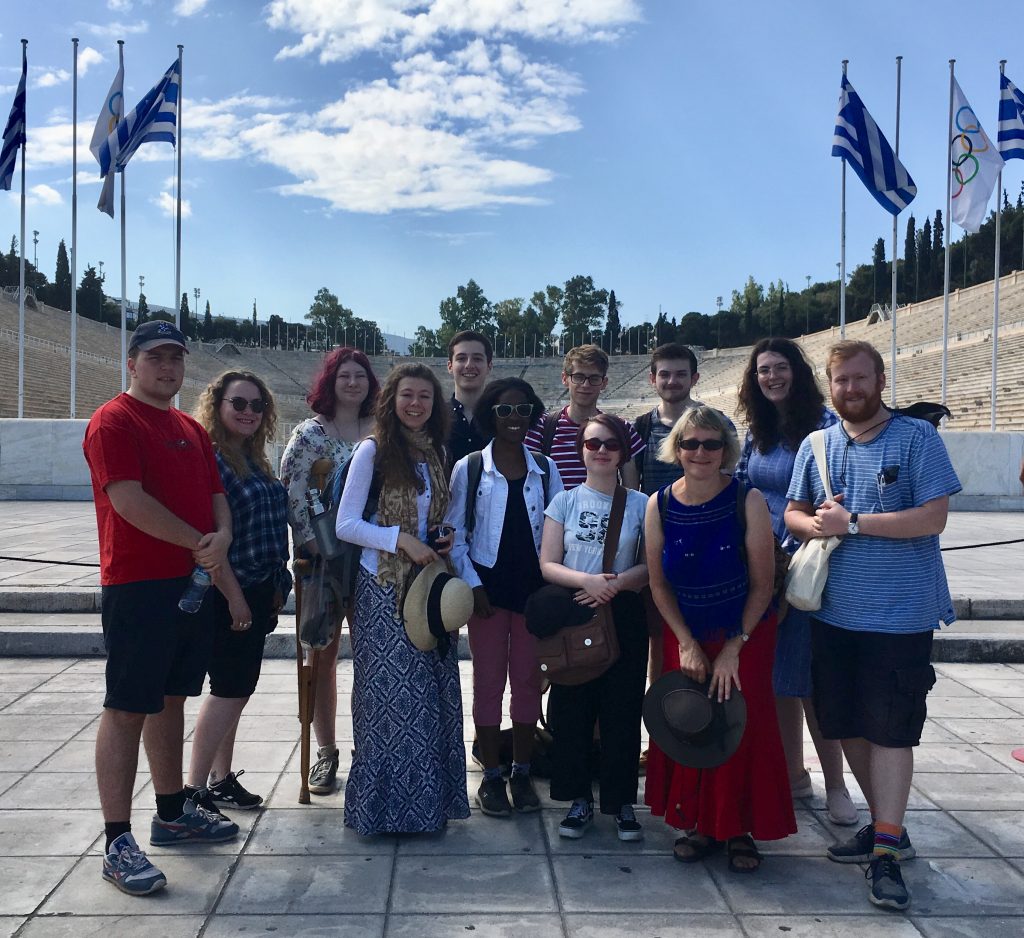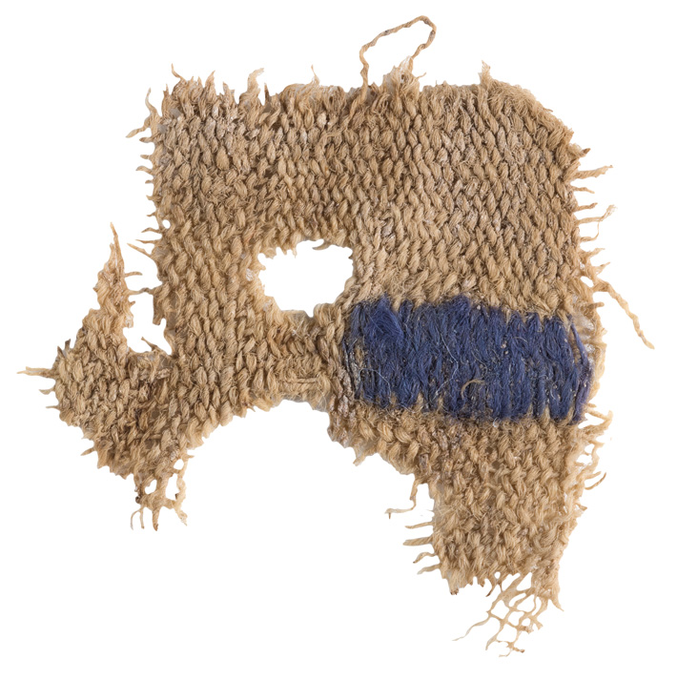 I could not have hoped for a more fulfilling way to round off my Classics degree at Reading than participating in a study trip to Greece – one could almost call it a Classics student’s ‘pilgrimage’. I first visited Athens over a decade ago when my interests in the ancient world were just beginning and I remember being awed by its incredible landscape and architecture. I was thrilled therefore to finally have the opportunity to return to the city and appreciate its sites from a more informed perspective, as well as experience other places that were completely new to me. The whole expedition was enhanced greatly by the company of an enthusiastic cohort of fellow students and the ever-illuminating insights of Professor Amy Smith and her assistant James Lloyd.
I could not have hoped for a more fulfilling way to round off my Classics degree at Reading than participating in a study trip to Greece – one could almost call it a Classics student’s ‘pilgrimage’. I first visited Athens over a decade ago when my interests in the ancient world were just beginning and I remember being awed by its incredible landscape and architecture. I was thrilled therefore to finally have the opportunity to return to the city and appreciate its sites from a more informed perspective, as well as experience other places that were completely new to me. The whole expedition was enhanced greatly by the company of an enthusiastic cohort of fellow students and the ever-illuminating insights of Professor Amy Smith and her assistant James Lloyd.
On disembarking at Eleftherios Venizelos Airport, we were immediately struck by the glorious Athenian sunshine, which continued to blaze down on us throughout our stay. We then boarded a characterful, vibrantly purple coach that conveyed us to the British School at Athens (BSA), with the local driver offering us his essential tips on Modern Greek along the way. Having unpacked, we soon set off on our first excursion: Lykavittos hill (closely situated to the BSA), from the summit of which we experienced the most spectacular views of the city and whetted our cultural appetites for all that lay ahead. We also worked up appetites of a more gastronomic nature from all the walking, winding up the day by sharing a meal together in true Greek fashion at a local restaurant, getting to know each other better and sampling a wide range of traditional dishes – many of which were savoured again later in the week!
Each day’s schedule was tightly packed with visits to ancient sites and museums, and I could not possibly do everything justice in a single blog post. Yet I shall at least mention a few of my personal highlights. Firstly, no trip to Athens would be complete without journeying up to the famed Acropolis. It was fantastic to explore not only the iconic buildings on its upper surface, but also both the north slope, featuring some important caves and sanctuaries, and the sites to the south: after writing my final-year dissertation on Sophocles, I could hardly leave without paying homage to the Theatre of Dionysos, and James Lloyd even treated us here to an impromptu performance of an ancient Greek song. Another of my favourite attractions was the Temple of Hephaistos, beautifully situated in the Agora and amazingly well preserved. Further sites visited were the Kerameikos, the Temple of Olympian Zeus, the Roman Forum and Hadrian’s Library.
 Of the museums, I was especially excited to visit the Acropolis Museum which was still being built during my previous trip. It certainly did not fail to impress. Its transparent walls and ideal location enabled us to look directly across at the Acropolis itself while admiring the displays, and so more easily envision everything in authentic context. One of the museum archaeologists, Dr Fiorentina Frangopoulou, helped us to understand the importance of the museum to the modern Greeks. In addition to the splendid array of statues and artefacts, I was particularly charmed by the imaginative lego reconstruction of the Acropolis on the second floor! The National Archeological Museum was also full of fascinating objects, including the famous ‘Mask of Agamemnon’ discovered by Heinrich Schliemann at Mycenae. Among my personal favourites were a Cycladic harper figurine lost in song, an ancient piggy bank and a vase depicting a musical goose! In addition, I enjoyed the smaller yet equally absorbing Cycladic and Numismatic Museums.
Of the museums, I was especially excited to visit the Acropolis Museum which was still being built during my previous trip. It certainly did not fail to impress. Its transparent walls and ideal location enabled us to look directly across at the Acropolis itself while admiring the displays, and so more easily envision everything in authentic context. One of the museum archaeologists, Dr Fiorentina Frangopoulou, helped us to understand the importance of the museum to the modern Greeks. In addition to the splendid array of statues and artefacts, I was particularly charmed by the imaginative lego reconstruction of the Acropolis on the second floor! The National Archeological Museum was also full of fascinating objects, including the famous ‘Mask of Agamemnon’ discovered by Heinrich Schliemann at Mycenae. Among my personal favourites were a Cycladic harper figurine lost in song, an ancient piggy bank and a vase depicting a musical goose! In addition, I enjoyed the smaller yet equally absorbing Cycladic and Numismatic Museums.
 We were fortunate to spend one of our days in Corinth, which included the highlight of the whole trip for me: visiting Acrocorinth, an enormous rock towering above the ancient city, rivalling even the Athenian Acropolis in its magnitude. Although most of the ruins at the top date from later, medieval times, the views it offers of the surrounding mountains, farmland and sea are simply breathtaking, giving the modern traveller a sense of how Greece would have appeared to its ancient inhabitants. Beautiful wildflowers, bees, butterflies and birdsong added magic to the landscape. On descending, we received excellent tours both of ancient Corinth and of its museum, from Drs Christopher Pfaff and Ioulia Tzonou of the American School of Classical Studies at Athens. Dr Tzonou even gave us a hands-on experience of artefacts, including a stone foot dedicated to Asklepios, the god of healing, and some lead curse tablets, which thankfully cast no calamities upon our trip! While journeying back to Athens, we had the chance to stop off at the site of the Isthmian games and also spotted the historic islands of Salamis and Aegina from the coach.
We were fortunate to spend one of our days in Corinth, which included the highlight of the whole trip for me: visiting Acrocorinth, an enormous rock towering above the ancient city, rivalling even the Athenian Acropolis in its magnitude. Although most of the ruins at the top date from later, medieval times, the views it offers of the surrounding mountains, farmland and sea are simply breathtaking, giving the modern traveller a sense of how Greece would have appeared to its ancient inhabitants. Beautiful wildflowers, bees, butterflies and birdsong added magic to the landscape. On descending, we received excellent tours both of ancient Corinth and of its museum, from Drs Christopher Pfaff and Ioulia Tzonou of the American School of Classical Studies at Athens. Dr Tzonou even gave us a hands-on experience of artefacts, including a stone foot dedicated to Asklepios, the god of healing, and some lead curse tablets, which thankfully cast no calamities upon our trip! While journeying back to Athens, we had the chance to stop off at the site of the Isthmian games and also spotted the historic islands of Salamis and Aegina from the coach.
In addition to scheduled group outings, we had some free time to spend on whatever stirred our own individual interests. I particularly appreciated the further stunning panoramas available from Philopappou Hill and the Areopagus (which I made sure to ascend via the steeper, ancient steps!), and it was also enjoyable just to wander round and take in the atmosphere of some of Athens’ more touristy areas such as Plaka, with its pretty winding streets and rows of shops. Above all, I loved being surrounded by Greek lettering wherever I went: I had great fun trying to decipher signs and inscriptions.
As a lover of the animal world, I could not conclude without mentioning the thirteen hoopoes I spotted during our stay (one of my favourite birds and very apt in terms of Greek mythology). We also fell in love with the numerous tortoises we found chilling out amid the ancient ruins, as well as the free-roaming dogs, cats and kittens which did their very best to distract us from our primary mission!
I cannot thank the Classics Department enough for giving me this wonderful opportunity at the end of my undergraduate journey, as well as the BSA for hosting us. I would certainly encourage other students to embark on future study trips (…though do be prepared to walk … a lot!).
Katherine Evans


 We would like to bring to your attention a fully-funded PhD studentship:
We would like to bring to your attention a fully-funded PhD studentship:


















